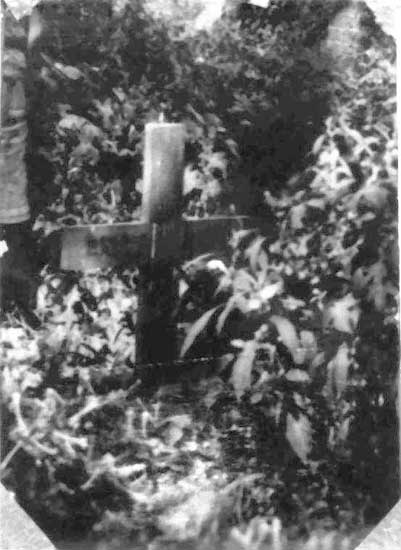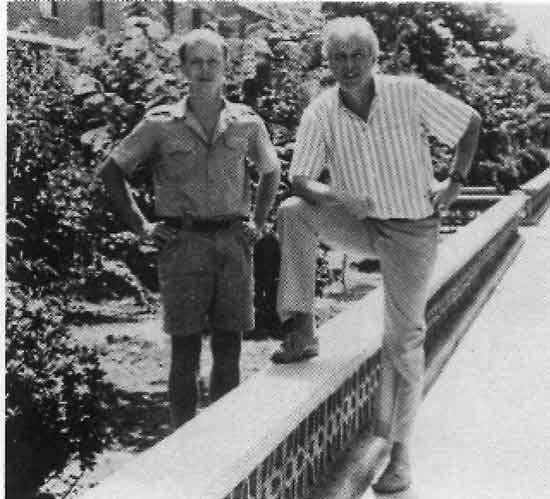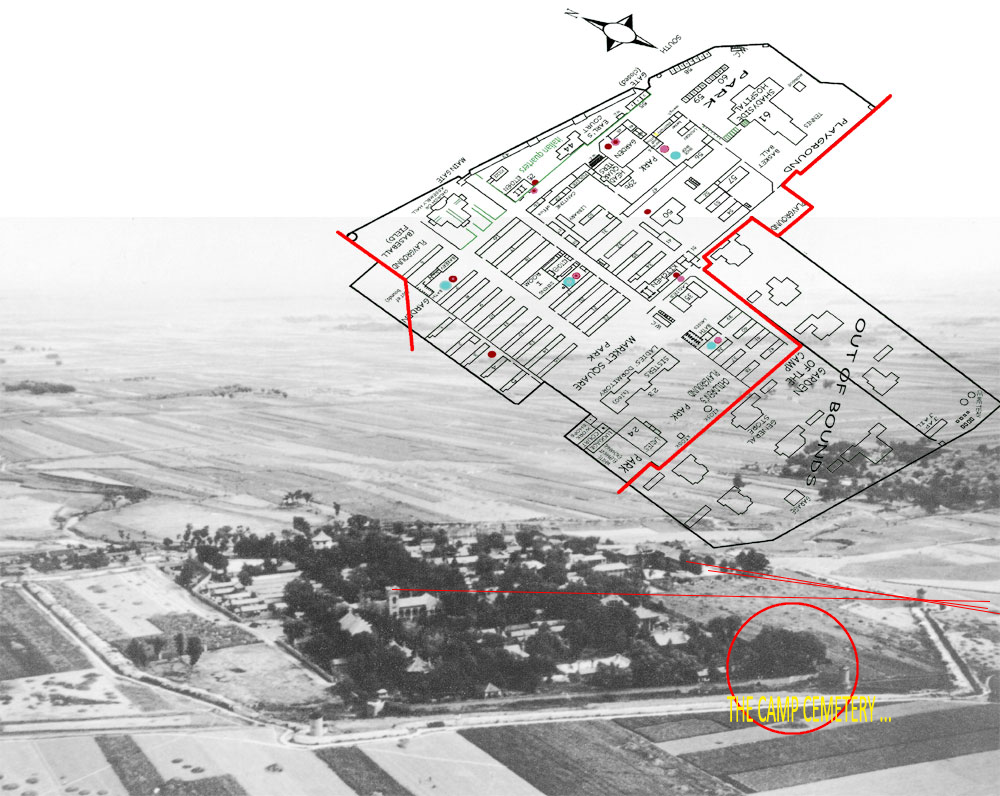Eric Liddell's grave ...
[excerpt from] - the register of graves:
"plot-59, ERIC H.LIDDELL, Age: 43, Died February 21st, 1945, British, Death Certificate Issued by J.W.GRICE"
CHINESE GRAVE’S SECRET:
A FAMED RUNNER RESTS HERE
A FAMED RUNNER RESTS HERE
A marker at last for the devout hero of “Chariots of Fire”
By, BARBARA BASLER
Special to the New York Times
December 2, 1990
HONG KONG, Dec.1
Eric Liddell, the extraordinary runner whose brief, brilliant athletic career was the subject of the movie, "Chariots of Fire” has lain in an unmarked grave in Weifang, China, for the last 45 years.
Mr Liddell, who astounded the world at the 1924 Paris Olympics when he stood by his Calvinist, principles and refused to compete on Sunday, spent his adult life as a missionary in, China.
He was interned in a Japanese prison camp in Weifang, where he died and was buried in 1945.

Eric Liddell's grave as it was in 1945.
Now, after months of research, a fellow Scotsman, Charles T. Walker, has found Mr. Liddell's grave in a small cemetery next to the sprawling Weifang Second Middle School. And after more months of delicate negotiations, the provincial Chinese authorities have agreed to permit a special memorial to be placed over the plot.
"I was working on a book about Scots, and the more I talked to people who had known Liddell the more convinced we all became that his grave should be marked," said Mr. Walker, a consulting engineer in Hong Kong.
Edinburgh University, which Mr. Liddell attended, is arranging for the memorial, a simple headstone carved from black Scottish granite that will be shipped to Weifang in the spring.
A gifted runner, Mr. Liddell was heavily favored to win the 100-meter race in Paris, in 1924. But when the heats for the event were held on a Sunday, the deeply religious athlete made headlines around the world when he gave up his chance at a gold medal by refusing to compete on Sunday.
The coach of the British Olympic team then entered him in the 400-meter race, an event he had not trained for, and he; again astonished the world by winning first place. Mr. Liddell left for China in 1926 and spent the rest of his life working and teaching there as a missionary, primarily at the Tientsin Anglo-Chinese College.
Even when China was torn apart by civil war and ravaged by the invading Japanese, Mr. Liddell remained on the mainland, leaving his teaching post only to help with relief work in northern China for several years.
Mr. Walker said that when word spread he intended to find the grave and erect a memorial, "offers of help, money, came flooding in," from Scotland, England and Hong Kong.
“There was a need to harness all that good will," Mr. Walker said, and this week he and a group of prominent Hong Kong business and civic leaders announced the formation of the Eric Liddell Foundation, which will sponsor athletic training for youngsters from China, Hong Kong and Britain.
A Student's Recollections
In January; David Puttnam, the producer of "Chariots of Fire," will journey to Hong Kong to attend a fund-raising event for the foundation and is scheduled to speak about Mr: Liddell's life at a screening of the movie.
Cheng Hon-kwan, a director of the foundation and a member of Hong Kong's Executive and Legislative Councils, was a student at the Tientsin School. In 1941 he was 14 years old, and Mr. Liddell, who had returned from relief work, was his science teacher.
"He was very well liked by the students,” Mr: Cheng recalled. "We all knew he was an Olympic gold medal winner and that he had not run on Sunday. Everyone thought of him as a hero. He was tall and very fit, but be was bald headed by then. My impression was of a very lively, very likable man."
Mr. Cheng said Mr. Liddell was his teacher for only a few months. "War broke out in the Pacific," be said; “and the Japanese came and took all the British teachers away to camps."
Mr. Liddell was interned along with 1,800 other Westerners in Weifang, then a remote provincial farming center about 500 miles northeast of Beijing. Mr. Walker said Mr. Liddell's wife, Florence, who was pregnant, had left China earlier with their two daughters.
"There were quite a few youngsters in the camp who were interned without their parents, because they had been at a nearby boarding school," Mr. Walker said. "Liddell was put in charge of one of the dorms for these boys. He was called Uncle Eric, and he organized sports and all kinds of activities for them.
"The people who knew Eric all said that he was a very special person," Mr. Walker said. "He was a strong believer, but he wasn't a pushy Christian."
Mr. Liddell was 43 years old when he died of a brain tumor in the camp. Several men who were boys at the time recalled his burial for Mr. Walker.

Eric Liddell's grave in 1991.
Graveyard Is Intact
Mr.-Walker and some friends went to Weifang, last July, armed with notes from the former prisoners and an old map of the area. Though the provincial town is now an industrial city of four million people, the little camp grave-yard was still intact, next to the sprawling post-war school. The graves in the old camp cemetery, Mr. Walker said, were marked only with small wooden crosses, but people present at the funeral recalled which was Mr. Liddell's.
The granite stone marker for the grave will be engraved with Mr. Liddell's name, a brief biography in English and Chinese, and a quotation from Isaiah:
"They shall mount up with wings as eagles; they shall run, and not be weary.”
-#-

Eric Liddell's grave as it was in 1945.








